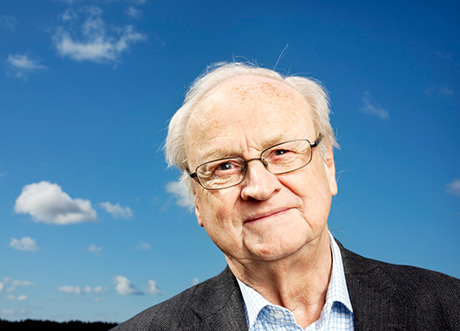- Home
- News and events
- Find news
- In memory of Arvid Carlsson (1923-2018)
In memory of Arvid Carlsson (1923-2018)
Arvid Carlsson, professor of pharmacology at Sahlgrenska Academy, University of Gothenburg, has passed away, at the age of 95. Arvid Carlsson was awarded The Nobel Prize in Physiology or Medicine for his pioneering research on the signal substances of the brain.

Eva Wiberg, Vice-Chancellor, University of Gothenburg
It is an honor for us at University of Gothenburg to have had such a successful researcher and co-worker as Arvid Carlsson with us. He has made a fantastic contribution to science and in his work inspired students and the research community in both Sweden and all over the world.
Agneta Holmäng, dean, Sahlgrenska Academy at University of Gothenburg
Sahlgrenska Academy misses both a very good friend and co-worker, but also an outstanding researcher. Arvid Carlsson is the originator of several major discoveries that led to dramatic improvements in quality of life for millions of patients with neurological and psychiatric disorders.
Arvid Carlsson, in a podcast from Sahlgrenska Academy, University of Gothenburg, 2016
Dopamine is involved in everything that happens in our brain, all the important functions.
If you look at the number of citations dealing with dopamine, over the decades, it was going up all the time, dramatically, and finally it was so high that the Nobel assembly couldn’t avoid me.
By acquiring knowledge on how substances such as dopamine and serotonin can be influenced, Arvid Carlsson and his research team were part of developing medicines that increase the mobility of patients with Parkinson’s disease and help improve the lives of those with schizophrenia. In addition, their research laid the foundation for modern medicines against anxiety and depression.
Arvid Carlsson was one of the Gothenburg researchers who set the stage for close cooperation with the pharmaceutical company Astra Hassle, later AstraZeneca – a collaboration that led to internationally renowned medicines like Seloken, Zelmid, Plendil and Losec.
Scientific breakthrough
Arvid Carlsson was, in his early career, able to demonstrate that dopamine acts as a message carrier molecule in the brain, and that a shortage of this substance gives rise to impaired motor skills in the case of Parkinson's disease, for example.
In clinical studies, an agent which is converted into dopamine in the brain, DOPA, was found to lead to massively improved motor skills in many severely disabled patients. For a long time this agent has been the most effective treatment available for Parkinson's disease.
Arvid Carlsson's studies into the function of dopamine led to another scientific breakthrough in 1963. He discovered that the medications which ease the symptoms of schizophrenia and other psychotic diseases reduce the influence of dopamine in the brain.
Treatment revolution
Arvid Carlsson and his colleagues were also the first people to realise that selective amplification of the signal substance serotonin is an effective and fairly gentle way of treating depression. Prozac, which revolutionised the treatment of depression and anxiety diseases, is based on this mode of action.
The observation that it is possible to influence the symptoms of Parkinson's disease and psychosis by modifying dopamine activity has been of crucial importance to our understanding of these diseases. But even more important is the fact that these studies have made it clear for the first time that it is actually possible to influence the function of the brain by modulating the signal substances that deal with communication between the neurons by means of medicines.
Later research on pharmacological therapy for many neurological and psychiatric diseases is to alarge extent based on this strategy demonstrated by Arvid Carlsson.
In 2016 Arvid Carlsson was interviewed in a podcast at his faculty, Sahlgrenska Academy, about his ongoing research and all the awards he had received during his long career:
“I couldn’t have received so many prizes if I had got the Nobel Prize earlier, because then they stop giving other prizes.”
“The award that you get from patients, compared to all the awards I have received, is much more important.”
- Podcast with Arvid Carlsson 2015 (Swedish)
- Podcast with Arvid Carlsson 2016 (English)
- About The Nobel Prize in Physiology or Medicine 2000 (English, French, German, Swedish)
Press contact
Margareta Gustafsson Kubista, phone: +46 705 30 19 80, e-mail: margareta.g.kubista@gu.se
Photo
Johan Wingborg/University of Gothenburg. Go to bildbank.gu.se for more photos.